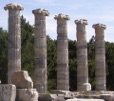OTHER COURSES IN ROTATION
Ancient History / Classical Civilization
Introduction to Classical Antiquity (Clst 101)
This course provides an introduction to the ancient Greek and Roman worlds and to the varied disciplinary approaches that inform our study of classical antiquity. Students will explore touchstones in the literature, mythology, history, art, and archaeology of ancient Greece and Rome; these include the Trojan War, the Olympic Games, Athenian culture in the age of democracy, the rise and fall of Rome’s empire, the violence of the Colosseum, and the emergence of Christianity. In the process, students will become familiar with key aspects of Greek and Roman culture while learning about how we in the modern world construct our knowledge of the past.
History of the Ancient Roman World (Clst 121 / Hist 121)
In this course, we will survey some of the major problems in Roman History, with particular emphasis on the period between the third century BCE and the second century CE (that is, the period in which the city of Rome became the capital of an expanding and multicultural empire). We will explore how the development and articulation of Roman imperial power during this period affected not only the ancient world's political life, but also its demography, its economy, and its culture. Considerable attention will be devoted to questions of method: how do we answer questions about the Roman past?
Ancient Greek and Roman Historiography (Clst 220 / Hist 296)
This course will provide a survey of the most important historical writers of the Greek and Roman world. We will read extensive selections from their work in translation, and discuss both the development of historiography as a literary genre and the development of history as a discipline in the ancient world. Finally, we will consider the implications these findings hold for our ability to use the works of Greek and Roman historical writers in our own efforts to construct narratives of the past.
War and Society in Classical Antiquity (Clst 223 / Hist 237)
In this course we will study the interplay between warfare and the political, social, and economic structures of the ancient Greek and Roman worlds. We will explore motivations for and ideologies of armed conflict, the impact of war on political and cultural development, the evolution of tactics and strategy, and the effects of hegemonic and imperial expansion on both the conquerors and the conquered. The course readings will incorporate foundational modern perspectives, but will emphasize ancient sources. All ancient sources will be read in English translation.
The Greeks and the Persian Empire (Clst 224 / Hist 111)
From the mid sixth century BCE until the end of the fourth century BCE, Greek city-states engaged repeatedly in warfare, diplomacy, and cultural exchange with the vast Persian Empire. In this course we will explore what the ancient evidence can tell us about episodes of such engagement, and about the ways in which these episodes shaped the historical development of both the Persian Empire and the Greek world. All sources will be read in English translation.
Greek / Latin
Xenophon (Cgrk 221)
In this course, we will read extensive selections from Xenophon’s Anabasis. We will also devote class time to discussions of Xenophon’s contribution to the development of historiography as a literary genre, and to discussions of the text’s value as a source for questions related to the social and military history of the ancient Greek world.
Herodotus (Cgrk 222)
This course offers students an opportunity to develop their skills as readers of Classical Greek by studying excerpts from the work of Herodotus — both the oldest piece of extended prose narrative to survive from the Ancient Greek world, and a text that became a model for later Greek authors interested in the systematic exploration of history. The course will focus heavily on translation, but it will also feature key works of modern scholarship designed to foster contemplation and discussion about both historiography in general and Herodotus’ approach to history in particular.
